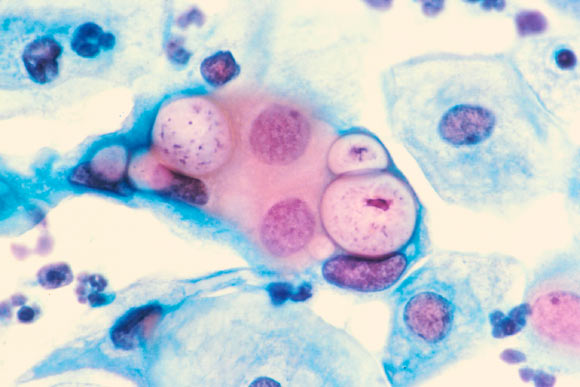A team of scientists in Canada has developed the first widely protective vaccine against chlamydia, a common sexual transmitted infection.

Human pap smear showing Chlamydia trachomatis in the vacuoles at 500x. Image credit: Lance Liotta Laboratory.
In a study published in the July 25 issue of the journal Vaccine, the team shows that a novel chlamydial antigen known as BD584 is a potential vaccine candidate for the most common species of chlamydia known as Chlamydia trachomatis.
“As most C. trachomatis infections are asymptomatic, chlamydia can often go untreated and lead to upper genital tract infections, pelvic inflammatory disease, and infertility,” said co-author Dr. David Bulir, from the Michael G. DeGroote Institute for Infectious Disease Research and St. Joseph’s Research Institute.
“This is why the promise of a vaccine would be extremely beneficial.”
In the study, BD584 was able to reduce chlamydial shedding – a symptom of C. trachomatis – by 95%.
The antigen also decreased hydrosalpinx, another C. trachomatis symptom which involves fallopian tubes being blocked with serous fluids, by 87.5%.
“The results look very promising,” said study senior author Prof. James Mahony, from McMaster University’s Department of Pathology and Molecular Medicine, the Michael G. DeGroote Institute for Infectious Disease Research and St. Joseph’s Research Institute.
“Not only is the vaccine effective, it also has the potential to be widely protective against all C. trachomatis strains, including those that cause trachoma,” added co-author Steven Liang, from the Michael G. DeGroote Institute for Infectious Disease Research and St. Joseph’s Research Institute.
“The vaccine would be administered through the nose. This is easy and painless and does not require highly trained health professionals to administer, and that makes it an inexpensive solution for developing nations,” he added.
The next step is more testing for effectiveness against different strains of Chlamydia and in different formulations.
_____
David C. Bulir et al. 2016. Immunization with chlamydial type III secretion antigens reduces vaginal shedding and prevents fallopian tube pathology following live C. muridarum challenge. Vaccine 34 (34): 3979-3985; doi: 10.1016/j.vaccine.2016.06.046







